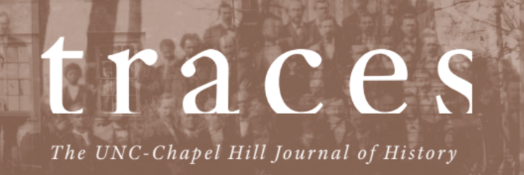Call for Papers
Traces: The UNC-Chapel Hill Journal of History is the History Department’s yearly academic publication. We have existed as an organization managed exclusively by students since our founding in 2011.
Our mission is to showcase the historical research produced by undergraduate students at UNC-CH; however, we are also seeking work produced by undergraduate authors from regional universities in order to expand the reach of our publication. We encourage authors to submit any original history research papers they might have recently written for a history seminar, as a final paper for a history or history adjacent course, or as part of an independent research project. Having your work published with Traces is a great way to be exposed to the process of academic publishing, looks good on a CV, and will definitely give you an edge if you are considering applying to graduate school. We do not have a set length in mind, however, papers published in Traces tend to run between 15-25 pages long. Papers substantially longer or shorter than this are less likely to be accepted. Similarly, we do not have a specific theme in mind; ours is an open call for papers (CFP).
We put out a CFP in the Fall and Spring of each academic year, and we currently publish one yearly issue that includes Fall and Spring submissions at the end of the academic year. We will update this site with submission deadlines when a CFP is active.
The Fall 2024 Call for Papers is now closed, and we will circulate another call in Spring 2025.
Scoring Guide
Submissions are scored with the following criteria in mind.
- Is this a history paper? Is this based on original research? Does this advance an argument?
- Does the paper pose a significant analytical question?
- Does the paper offer a clear “thesis,” i.e. argumentative answer to that question?
- Does the paper analyze and evaluate primary sources to sustain its argument?
- Does the paper engage relevant historiography?
- Does the paper possess a coherent structure and clear organization?
- Does the paper avoid an excessive amount of common grammar mistakes?
Editorial Schedule
Traces has a fairly rapid editorial process, with two rounds of revisions. Each round is four weeks long, and authors are expected to stay within this schedule to the best of their ability, communicating any concerns or questions as soon as they are able. Authors whose papers are accepted will agree to work within this schedule by signing our author agreement, delivered as part of their acceptance letter.
In the first two weeks, we will work closely with your paper in order to bring it to the highest standard for publication. This first round of editorial work will focus primarily on your paper’s argument, theoretical framework, and general flow. We will then send the paper over to you.
In the next two weeks, authors will apply the edits that we suggested in the way they best see fit. they will have two weeks to work on your paper.
In the next two weeks, we will carry out the second round of edits, focused primarily on grammar, syntax, and overall readability.
In the final two weeks, authors will apply the edits that we suggested in the way they best see fit. During this time period, authors will also be expected to confirm that their citations are properly formatted in Chicago style, to confirm they have the copyright permissions for images they may have in their paper, and we ask that authors include a short (roughly 200 word) abstract on the first page of their paper.
